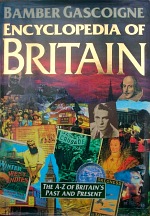| |

More than 5000 entries on the history, culture and life of Britain (published in 1993 by Macmillan, now out of print)
|
America
|
|
|
From the 1570s there had been various English attempts to colonize the coast of north America, promoted by men such as Walter *Raleigh. Most failed immediately, the nearest to success being a colony on *Roanoke Island, off North Carolina, in 1587. There was born there in that year the first New World child of English parents, by name Virginia Dare. But three years later no trace remained of the settlement. The first to survive permanently was *Jamestown, settled in 1607 and nursed through its early struggles by the leadership of John *Smith. It developed into the colony of Virginia; the general area had been named earlier after Elizabeth, the Virgin Queen. Jamestown itself commemorates her successor, James I.
|
|
|
|
|
Virginia was colonized with various motives, which included expanding Britain's trade and checking the advance in America of Spain and Portugal. In other colonies there was a religious dimension, whether it was Protestant radicals seeking a new life (the *Pilgrim Fathers in Massachusetts, William *Penn in Pennsylvania) or Roman Catholics in need of a haven – as was the case with *Maryland, established by the son of a Catholic convert, Lord Baltimore, and named after Henrietta Maria, the wife of Charles I.
|
|
|
|
|
Meanwhile others were settling too. In the 1620s the Dutch established a colony on what became the most prosperous island of the eastern seaboard. They called it *New Amsterdam. But the English were now strong enough to dominate this small group in their midst. New Amsterdam was surrendered in 1664 and became New York. By the end of the 17C twelve British colonies had been established as separate entities; *Georgia was added in 1733.
|
|
|
|
|
A stronger European power than the Dutch posed a greater threat to the British presence in America. The French had been to the north, in *Canada, since the 16C; now, in the early 18C, they settled to the south and west, establishing New Orleans and the territory of *Louisiana (named after Louis XIV), for which they claimed all the land drained by the Mississippi. In this way they threatened to confine the British to the eastern coast of the continent.
|
|
|
|
|
In the 18C France and Britain were enemies in a series of European wars (*Spanish Succession, *Austrian Succession, *Seven Years War). Each was also fought in north America, and the result was that by the 1760s all the French territories in America had been ceded to Britain. This sudden expansion gave great confidence to the British colonists, but also involved Britain in new administrative and military expenses. In these changes lay the beginning of the end of British rule.
|
|
|
|
|
The government in London devised various ways of raising money from the colonies, causing particular resentment in 1765 with a stamp duty (a tax on legal documents and newspapers) and subsequently with other duties on various everyday commodities. After furious protest these were all repealed except the duty on tea, which provoked in 1773 the *Boston Tea Party. Some in Britain, such as Edmund *Burke, urged a conciliatory approach, but two years of mounting tension ended with the British government attempting to enforce its authority in America. The resulting War of *American Independence began in 1775 and led a year later to the *Declaration of Independence. Britain's first colonies thus evolved into an independent country, the first of many to share the English language and to inherit elements of British culture.
|
|
|
|